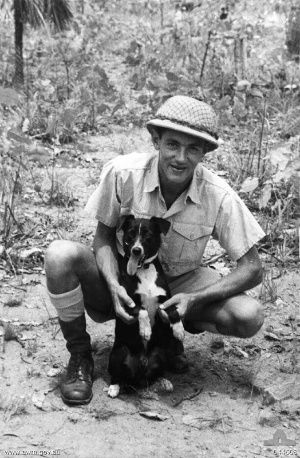Gunner (dog) facts for kids

Gunner with his handler Percy Westcott
|
|
| Species | Dog |
|---|---|
| Breed | Kelpie |
| Sex | Male |
| Born | c. August 1941 Darwin, Northern Territory, Australia |
| Died | April 30, 1955 (aged 13) |
| Nation from | Australian |
| Employer | Royal Australian Air Force |
| Years active | 1942–1945 |
| Known for | Air-raid early warning during World War II |
| Owner | Percy Westcott |
| Named after | Gunner (rank) |
Gunner (born around August 1941) was a brave Kelpie dog. He became famous during World War II for his amazing ability to warn Allied air force teams about approaching Japanese planes. Gunner could hear enemy aircraft long before humans or even early radar systems could. He helped save many lives in Darwin, Australia.
Contents
Gunner: The Hero Dog of World War II
A Stray Puppy Finds a Home
Gunner was a black and white Kelpie. No one knows exactly where he came from. He was found as a six-month-old stray puppy on February 19, 1942. This was right after the first Japanese air raid on Darwin.
He was discovered under the ruins of a mess hut at RAAF Darwin. Personnel from No. 2 Squadron of the Royal Australian Air Force (RAAF) heard him whimpering. Gunner had a broken front leg.
They took the injured puppy to a field hospital. A medical officer there said he couldn't treat a patient without a name and number. So, Gunner was given the name "Gunner" and the number "0000". His leg was set and put in a cast. That's how Gunner officially became part of the RAAF records!
Leading Aircraftman Percy Westcott was one of the people who found Gunner. He became Gunner's owner and handler. The young dog was very scared at first. But he quickly felt better with the care from Westcott and the other air force members.
Gunner's Amazing Hearing
About a week later, Gunner showed his incredible hearing skills. The RAAF personnel were busy with their daily tasks at the airfield. Suddenly, Gunner became very agitated. He started to whine and jump around.
Soon after, the airmen heard the sound of approaching aircraft engines. A few minutes later, Japanese planes appeared over Darwin. They began bombing and strafing the town.
Two days later, Gunner did the same thing. He started whimpering and jumping. Not long after, another air attack began. This pattern happened again and again over the next few weeks.
Gunner would get agitated and run for shelter long before the air raid sirens sounded. His hearing was so sharp that he could warn RAAF personnel up to 20 minutes before Japanese planes arrived. This was even before the basic radar systems of the time could detect them.
What's more, Gunner didn't act this way when he heard Allied planes. He could tell the difference between the sounds of Allied and Japanese aircraft engines!
Gunner was so reliable that Wing Commander Tich McFarlane, the commanding officer of 2 Squadron, gave special permission. He allowed Westcott to sound a portable air raid siren whenever Gunner warned him. Later, when many stray dogs became a problem on the base, McFarlane ordered that only Gunner could stay.
Life as an Air Force Dog
Gunner became a true member of the air force team. He slept under Westcott's bunk bed. He even showered with the men in the shower block! Gunner would sit with the men at outdoor movie nights. He also went up with the pilots during practice take-offs and landings.
About 18 months later, Westcott was moved to Melbourne. Gunner stayed in Darwin. The RAAF butcher looked after him. What happened to Gunner after that is not fully known. He passed away on April 30, 1955, at about 13 years old.
See also
- Dickin Medal
- PDSA Gold Medal
- Dogs in warfare
- Gunner
- List of individual dogs
 | Delilah Pierce |
 | Gordon Parks |
 | Augusta Savage |
 | Charles Ethan Porter |

